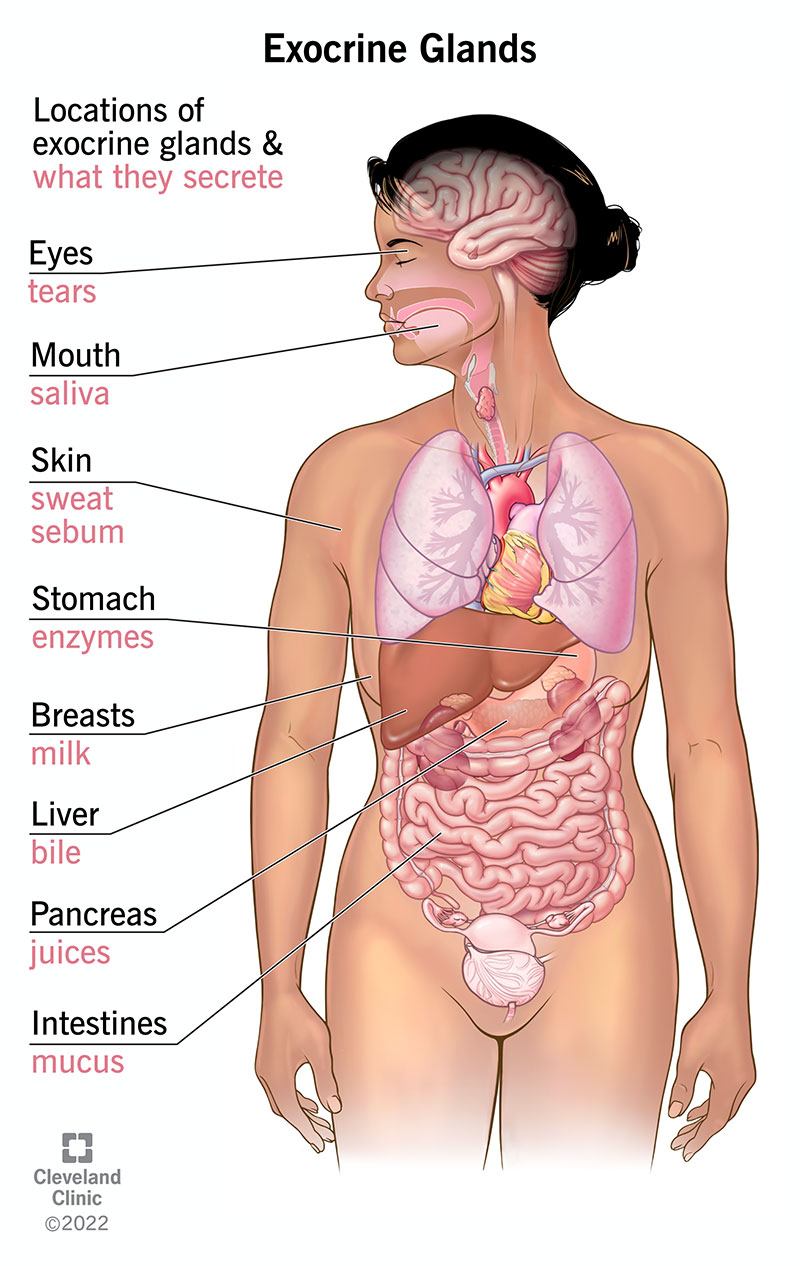Exocrine glands secrete substances through ducts onto your bodily surfaces. Exocrine glands can be found in many different organs and have many different functions. Exocrine glands secrete sweat from your sweat glands, tears from your lacrimal glands, saliva from your salivary glands, milk from your mammary glands and more.
Advertisement
Cleveland Clinic is a non-profit academic medical center. Advertising on our site helps support our mission. We do not endorse non-Cleveland Clinic products or services. Policy

Image content: This image is available to view online.
View image online (https://my.clevelandclinic.org/-/scassets/images/org/health/articles/22947-exocrine-glands)
Exocrine glands release (secrete) substances through openings (ducts) onto your body surfaces. Exocrine glands secrete sweat, tears, saliva, milk and digestive juices. A gland is a unit of cells that work together to create and secrete these substances. Exocrine glands can be found in many different organs in your body. They have a variety of functions.
Advertisement
Cleveland Clinic is a non-profit academic medical center. Advertising on our site helps support our mission. We do not endorse non-Cleveland Clinic products or services. Policy
Exocrine glands secrete their substances through ducts onto your body's surfaces. On the other hand, endocrine glands secrete their substances directly into your bloodstream. They’re called ductless glands. Endocrine glands are part of your endocrine system, and they secrete hormones. Examples of endocrine glands include your pituitary gland, thyroid gland and adrenal glands.
Many organs in your body use exocrine glands to function properly. Examples of exocrine glands include:
Advertisement
Your liver and pancreas are exocrine glands too. Your liver secretes bile through ducts into your gastrointestinal tract. Your pancreas secretes pancreatic juices through ducts into your gastrointestinal tract. But your liver and pancreas are also considered endocrine glands. They have dual roles. They also secrete hormones directly into your bloodstream.
Your exocrine glands have any different functions. The function of each depends on the organ in your body they’re associated with. The main purpose of all exocrine glands is to make and release substances to assist your body in some way. They help your body:
Your exocrine glands release their substances in different ways. The three main ways exocrine glands can secrete their substances are:
Many conditions can affect your exocrine glands because they're located throughout your body. These conditions include:
Advertisement
Your exocrine glands make and release many of the important substances your body needs to function properly. Exocrine glands can be found all over your body, from your skin to your breasts to your pancreas. Since they’re found all over your body, there’s a wide range of conditions they can affect. If you’re experiencing any new or concerning symptoms, talk to your healthcare provider. They can assess your health and make sure you’re on the right track.
Advertisement

Sign up for our Health Essentials emails for expert guidance on nutrition, fitness, sleep, skin care and more.
Learn more about the Health Library and our editorial process.
Cleveland Clinic’s health articles are based on evidence-backed information and review by medical professionals to ensure accuracy, reliability and up-to-date clinical standards.
Cleveland Clinic’s health articles are based on evidence-backed information and review by medical professionals to ensure accuracy, reliability and up-to-date clinical standards.
Cleveland Clinic’s primary care providers offer lifelong medical care. From sinus infections and high blood pressure to preventive screening, we’re here for you.
